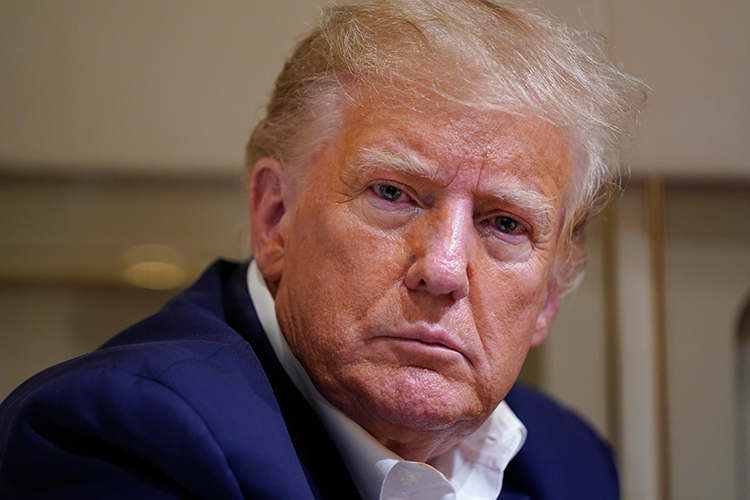What will the grand jury indictment mean for Trump?

Former President Donald Trump has been indicted by a Manhattan grand jury in New York City, according to reports. Photo by Evan Vucci/The Associated Press.
Updated: Former President Donald Trump’s reported indictment in the Stormy Daniels hush-money case raises questions about the impact on his new presidential campaign and the likelihood of a conviction.
Multiple publications were reporting on Trump’s indictment by a Manhattan grand jury in New York City, based on anonymous sources, including the New York Times and the Washington Post.
The office of Manhattan District Attorney Alvin L. Bragg Jr. confirmed the indictment Thursday evening and said Trump’s lawyers had been contacted to arrange the former president’s surrender. Sources told the New York Times there are more than two dozen counts.
The next step is for Trump to be photographed and fingerprinted. He “will surely be released in advance of trial,” according to a prior story by the Hill.
Charges are likely to brought under a New York law banning the falsification of business records. In the alleged scheme that resulted in federal charges against Trump’s lawyer Michael Cohen, Cohen paid $130,000 in hush money to adult film actress Stormy Daniels and was reimbursed by Trump, prosecutors said. Daniels has alleged that she had a sexual encounter with Trump, which he has denied.
The reimbursement was characterized as legal fees to cover up the true nature of the agreement, and the money was not reported as a contribution boosting Trump’s campaign, according to the allegations.
Cohen is now the “star witness” against Trump, according to the New York Times.
Under the state law, falsifying business records is a felony if it is done to aid or cover up another crime. Other violations would be misdemeanors. Bragg has previously said he was investigating whether the false record of payment could constitute a campaign-finance violation.
According to the New York Times, NBC News and the Hill, conviction is not assured, especially if there is an attempt to link the business records violation to a campaign-finance violation. Another possibility is to link the business records violation to a conspiracy charge, which would allege there was a conspiracy to cover up the affair before the election.
Trump could also argue in his defense that there was no “intent to defraud” as required by the law.
Trump gave a statement calling the indictment “political Persecution and Election Interference at the highest level in history,” according to a New York Times update.
“The Democrats have lied, cheated and stolen in their obsession with trying to ‘Get Trump,’ but now they’ve done the unthinkable,” he said. “Indicting a completely innocent person.”
Trump will still be able to run for president if he is convicted. The indictment could even provide a boost to his campaign as supporters rally around him, the Hill pointed out.
See also:
ABAJournal.com: “Experts see these problems with felony-records case against Trump over hush-money payments”
ABAJournal.com: Selective-prosecution argument in Trump falsified-records case is ‘long shot’ that may still resonate
ABAJournal.com: “Trump could conceivably run for president and even govern the US from prison, legal scholars say”
This article will be updated with links to subsequent coverage posted on Friday. Updated March 31 at 8:20 a.m. to report that the district attorney’s office confirmed the indictment.
Write a letter to the editor, share a story tip or update, or report an error.



